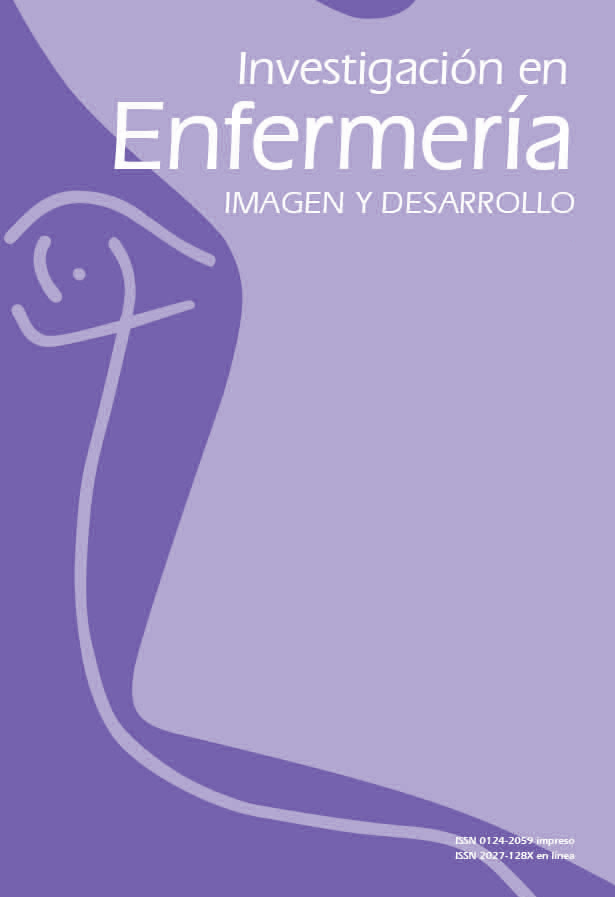Abstract
Introduction: The aging of people is currently awakening interest due to the increase in the life expectancy. Objective: To know the family environment of the elderly in the Centros Vida [Life Centers] in the city of Villavicencio and use the results to build guiding elements intended to educate professional caregivers, thus improving the elderly’s quality of life. Method: This work used a qualitative perspective with an ethnographic approach. Three CVs were selected randomly. From each CV a caregiver, an elderly person and his/her family participated in the study. Non-invasive observations and open interviews were used in the study. Nine interviews were completed, then typed and converted in textual units by using the software N-vivo 11. The analysis was carried out simultaneously with the field work. The data were then subject to coding and categorization. Results: Three categories were identified: (1) either accepting or resigning oneself to be an elderly person; (2) the needs of the old age, and (3) the family relationships when there is an elderly person in it. Conclusion: For the elderly, aging is a stage of life coming with losses, neglect, and suffering. This is a very difficult stage when the family does not have enough socio-economic resources; the family needs to accept and support the changes undergone by the elderly. To the caregivers working in the CVs, this is a stage of life requiring a lot of support by the family and the society.
2. Dulcey-Ruiz E. Envejecimiento y vejez: categorías y conceptos. Bogotá: Fundación Cepsiger y Red Latinoamericana de Gerontología; 2015.
3. Ostiguín-Meléndez RM, Bustamante-Edqén S. Dimensiones del cuidado en familias urbanas mexicanas. Enferm Universitaria. 2016;13(2):80-9. https://www.dx.doi.org/10.1016/j.reu.2016.03.007.
4. Bateson G, et al. Interacción familiar. Buenos Aires: Tiempo Contemporáneo; 1971.
5. Jiménez-Aguilera B, Baillet-Esquivel LE, Ávalos-Pérez F, Campos-Aragón L. Dependencia funcional y percepción de apoyo familiar en el adulto mayor. Atención Familiar. 2016;23(4):129-33. https://www.dx.doi.org/10.1016/j.af.2016.08.002.
6. Taylor J, Bogdan R. Introducción a los métodos cualitativos de investigación. Barcelona: Paidós; 1984.
7. Mauss M. Manual de etnografía. Buenos Aires: Fondo de Cultura Económica; 2006.
8. Boyle J. Estilos de etnografía. En: Morse J. Asuntos críticos en los métodos de investigación cualitativa. Medellín: Universidad de Antioquia; 2003.
9. Resolución 8430 del 4 de octubre 1993, por la cual se establecen las normas científicas, técnicas y administrativas para la investigación en salud [internet]. Disponible en: https://www.minsalud.gov.co/sites/rid/Lists/BibliotecaDigital/RIDE/DE/DIJ/RESOLUCION-8430-DE-1993.PDF.
10. D’Hyver C, Gutiérrez Robledo LM. Geriatría. 3a ed. México: Manual Moderno; 2014.
11. Alvarado García AM, Salazar Maya ÁM. Análisis del concepto de envejecimiento. Gerokomos [internet]. 2014 Jun [citado 2017 ago 8];25(2):57-62. https://www.dx.doi.org/10.4321/S1134-928X2014000200002.
12. Benavides-Caro CA. Deterioro cognitivo en el adulto mayor. Rev Mex Anestesiol [internet]. 2017;40(2):107-12. https://www.dx.doi.org/10.3389/fnagi2016.00253.
13. Cardona AS, Duque MG, Arango DC, Cardona AS. Risk of cognitive impairment in elderly people in the subregions of Antioquia, Colombia. Rev Bras Estud Populacao. 2016;33(3):613-28. http://dx.doi.org/10.20947/S0102-30982016c0008.
14. Guevara E. The importance of knowing “than expected for age” in cognitive assessment of the elderly patient. Rev Med Chile. 2016;144(12):16-21. https://www.dx.doi.org/10.4067/S0034-98872016001200016.
15. Aguilar Hernández RM. El modelo de enfermería Roper-Logan-Tierney en el adulto mayor. México: McGraw Hill; 2012.
16. Quiroga Capovilla H. Curso práctico de auxiliar de geriatría: Asistencia domiciliaria a personas de la tercera edad. Manual de formación profesional. Málaga, España: Daly; 2014.
17. Comisión Económica para América Latina y el Caribe (Cepal). Panorama social de América Latina [internet]. 2014. Disponible en: https://www.repositorio.cepal.org/handle/11362/37626.
18. Varela Pinedo LF. Health and quality of life in the elderly. Rev Peru Med Exp Salud Pública. 2016;33(2):199-201. https://www.dx.doi.org/10.17843/rpmesp.2016.332.2196.
19. Zapata-López BI, Delgado-Villamizar NL, Cardona-Arango D. Social and family support to the elderly in urban areas. Rev Salud Pública. 2015;17(6). https://www.dx.doi.org/10.15446/rsap.v17n6.34739.
20. Tello-Rodríguez T, Alarcón RD, Vizcarra-Escobar D. Mental health in older adults: Major neurocognitive, affective, and sleep disorders. Rev Peru Med Exp Salud Pública. 2016;33(2):342-50. https://www.dx.doi.org/10.17843/rpmesp.2016.332.2211.
21. Eckman M. Enfermería geriátrica. México: Manual Moderno; 2012.
22. Cortés-Muñoz C, Cardona-Arango D, Segura-Cardona Á, Garzón-Duque MO. Demographic, social, physical and mental factors associated with functional capacity in the elderly. Antioquia, Colombia. Rev Salud Pública. 2016;18(2):167-78. https://www.dx.doi.org/10.15446/rsap.v18n2.49237.
23. Melguizo Herrera E, Bertel de la Hoz A, Paternina Osorio D, Felfle Fuentes Y, Porto Osorio L. Cognitive stimulation of elderly residents in social protection centers in Cartagena, 2014. Rev Colomb Psiquiatr. 2016;46(4):229-36. https://www.dx.doi.org/10.1016/j.rcp.2016.09.008.
24. Ley 1276 del 5 de enero de 2009, a través de la cual se modifica la Ley 687 del 15 de agosto de 2001 y se establecen nuevos criterios de atención integral del adulto mayor en los centros de vida [internet]. Diario Oficial n.º 47.223 del 5 de enero de 2009. Disponible en: http://www.secretariasenado.gov.co/senado/basedoc/ley_1276_2009.html
The journal Investigación en Enfermería: Imagen y Desarrollo is registered under a Creative Commons Attribution 4.0 International Public License. Thus, this work may be reproduced, distributed, and publicly shared in digital format, as long as the names of the authors and Pontificia Universidad Javeriana are acknowledged. Others are allowed to quote, adapt, transform, auto-archive, republish, and create based on this material, for any purpose (even commercial ones), provided the authorship is duly acknowledged, a link to the original work is provided, and it is specified if changes have been made. Pontificia Universidad Javeriana does not hold the rights of published works and the authors are solely responsible for the contents of their works; they keep the moral, intellectual, privacy, and publicity rights.
Approving the intervention of the work (review, copy-editing, translation, layout) and the following outreach, are granted through an use license and not through an assignment of rights. This means the journal and Pontificia Universidad Javeriana cannot be held responsible for any ethical malpractice by the authors. As a consequence of the protection granted by the use license, the journal is not required to publish recantations or modify information already published, unless the errata stems from the editorial management process. Publishing contents in this journal does not generate royalties for contributors.



